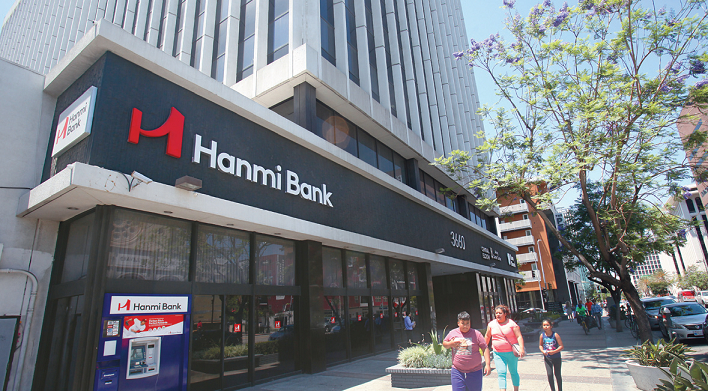Hanmi Bank is moving forward with plans to open a representative office in Seoul, South Korea.
On October 17, officials in the Korean-American banking industry said that Hanmi Bank had submitted a notification to the Korean Financial Services Commission to establish an office in the capital city of Korea.
The commission said that the application is still under review, but explained that there would not be much difficulty for Hanmi Bank to open a Seoul office as the establishment of an office is a declaration, not a license.
“We have submitted the necessary documents for the opening of the Seoul office to the Financial Services Commission and are waiting for the results,” said an official from Hanmi Bank, adding, ”We will make an official announcement once the results are available.”

Unlike branches, representative offices are not authorized to perform business activities such as conducting credit businesses. They are usually established to connect local customers with the headquarters, conduct market research, and collect market information. If finalized, Hanmi Bank will be the second Korean-American bank to open an office in Korea after the Bank of Hope.
The Korean-American banking community attributed the decision to expanding business with Korean companies branching out to the U.S., increasing Korean direct investment, and preparing for future branches.
Hanmi Bank is currently operating a Korea Desk that provides customized financial services to Korean companies in the U.S. Korean enterprises account for more than 10% of the bank’s total loan portfolio.
With the news that Hanmi Bank is planning to open a representative office in Seoul, the industry’s attention has been focused on what it means for large Korean-American banks to have a presence in Korea.
Currently, Bank of Hope is the only Korean-American bank with an office in Korea. Korean-American financial experts believe that large Korean-American banks, which are faced with limited growth in the U.S., are looking to establish offices and branches in Korea to strengthen their sales to Korean businesses looking to enter the U.S.
Korean companies surge into the U.S.
As the number of Korean companies preparing to enter the U.S. market has increased significantly, so has the number of Korean banks looking to attract them as customers. According to a recent report by the Korea International Trade Association’s (KITA) International Trade Studies, the U.S. is expected to account for 43.7% of Korean companies’ overseas direct investment in 2023, the highest share since 1988.
The improved investment environment in the U.S. is also attributed to the Joe Biden administration’s push to attract green and semiconductor companies. A Korean-American bank official said that Korean companies are aggressively expanding into the U.S., especially in areas with manufacturing facilities, such as Georgia and Texas.
Korean food and beauty companies are also increasingly entering the U.S. as Korean cultural products including entertainment businesses gain traction in the mainstream. The number of small and medium-sized enterprises (SMEs) and startups entering the U.S. has also seen a significant increase with the start of the 2020s.
More Koreans investing directly in the U.S.
The number of Koreans investing in the U.S. in various ways has also contributed to the push for Korean-American banks to establish representative offices in Korea.
According to a report released last month by South Korea’s National Tax Service (NTS), individual taxpayers held more than $6.67 billion in U.S. assets, including savings, stocks, collective investment schemes, and derivatives. That’s 69.8% of all individual foreign assets, by far the largest amount, indicating the Koreans’ heavy interest in investment in the United States.
“If you add up real estate investments that are not included in the NTS statistics, the amount of personal investment is probably much larger,” said a Korean-American banking official, adding, “Many Koreans use Korean-American banks for investment activities such as purchasing properties even if they don’t have a business in the U.S.” This means that the Seoul office will also serve as a forward base for attracting private clients.
New growth engines for Korean-American banks
The move is also seen as part of the Korean-American banks’ search for new catalyst sources of growth.
“Korean-American banks are looking for new opportunities by expanding into other states, but most of them are opening branches in areas with a high concentration of other Korean-American banks and competing fiercely,” said an official familiar with Korean-American banking. For large, well-capitalized banks, it is helpful to attract Korean companies planning to expand in the U.S. and wealthy Koreans considering direct investment to boost their profitability, he added. This is also because the Korean economy has grown by leaps and bounds, and the size of Korean companies and investments has become so large.
In the future, the banks can convert their offices into branches to expand their sales force in Korea. Opening a branch will enable full-fledged business activities such as making and receiving payments and establishing new business channels.
Bank of Hope, which is currently the only Korean-American bank with an office in South Korea, has also been steadily pushing to open a branch in Korea since the 2010s. Bank of Hope has been making its intention to open a branch in Seoul clear at public meetings, including press conferences.
BY WONHEE CHO, HOONSIK WOO [cho.wonhee@koreadaily.com]




